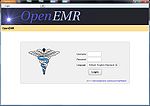OpenEMR 4.1.2 Users Guide
From OpenEMR Project Wiki
Other languages — Help us translating this wiki
• Afrikaans • አማርኛ • العربية • অসমীয়া • asturianu • azərbaycanca • български • বাংলা • brezhoneg • bosanski • català • corsu • čeština • dansk • Deutsch • ދިވެހިބަސް • Ελληνικά • Esperanto • español • eesti • euskara • فارسی • suomi • français • Frysk • Gaeilge • Kréyòl gwadloupéyen • Gàidhlig • galego • Alemannisch • ગુજરાતી • Hausa • עברית • हिन्दी • hrvatski • Kreyòl ayisyen • magyar • հայերեն • interlingua • Bahasa Indonesia • Igbo • íslenska • italiano • 日本語 • Jawa • ქართული • қазақша • ភាសាខ្មែរ • ಕನ್ನಡ • 한국어 • kurdî • Lëtzebuergesch • ລາວ • lietuvių • latviešu • Malagasy • македонски • മലയാളം • मराठी • Bahasa Melayu • Malti • မြန်မာဘာသာ • नेपाली • Nederlands • norsk nynorsk • norsk • occitan • Oromoo • ଓଡ଼ିଆ • ਪੰਜਾਬੀ • polski • پښتو • português • português do Brasil • română • română (Moldova) • русский • سنڌي • සිංහල • slovenčina • slovenščina • Soomaaliga • shqip • српски / srpski • svenska • தமிழ் • తెలుగు • тоҷикӣ • ไทย • Türkçe • українська • اردو • oʻzbekcha/ўзбекча • Tiếng Việt • Wolof • isiXhosa • Yorùbá • 中文(简体) • 中文(繁體) • isiZulu

Users Guide
Main Topics
- The Main Topics of the OpenEMR 4.1.2 User Guide is currently under construction. See the OpenEMR 4.1.0 Users Guide for the previous OpenEMR version manual.
Supplementary Topics
- User Settings
- OpenEMR Settings
- Import Standard Tables: Very simple to import(and upgrade) and activate standardized ICD9, ICD10, SNOMED and RxNorm data sets.
- ePrescribing
- Patient Portal
- Using "Direct" Communication: How to use "Direct" communication in OpenEMR.
- Electronic Procedure Orders
- Patient Note and Form Searching
- Clinical Decision Rules
- Language Translations
- Configure and Add Code Types: Modify settings of current code types and adding of new code types (for example, ICPC, the coding set for General Practitioners for as proposed by WONCA, World Organisation for Family Doctors).
- Nation Notes: Medical Record Template engine with a WYSIWYG editor.
- LBV (Layout Based Visit) Form customization & layout
- LBV Forms For Ophthalmology A Pictorial Guide.
- CAMOS module: CAMOS (Computer Aided Medical Ordering System) is, on the surface, just a fancy interface for organizing and choosing pieces of text to insert into a patient's chart. It is designed to be intuitive and easy to use.
- Procedure configuration & order process
- Next three files are step wise explanation of what and how to configure Procedures in PDF file format:
- Laboratory Exchange User Documentation
- Batch Payment (EOP) and Statement Processing
- Access Controls
- Facility Specific User Information
- Break Glass - Emergency Access configuration
- Encryption and Decryption of document
- Pharmacy Dispensary
- Multiple Sites Module
- Securing OpenEMR
- Fee sheet/service code entry & customization - from Openemr version 3.2
- CouchDB Documents Module - Using CouchDB to store patient documents.
- Phone numbers input: How to input phone numbers in three different places used in Open EMR.
Video Tutorials
- The Video Tutorials of the OpenEMR 4.1.2 User Guide is currently under construction. See the OpenEMR 4.1.0 Users Guide for the previous OpenEMR version manual.
Frequently Asked Questions (FAQ)
- Plan to post questions here that are frequently asked on the forums for OpenEMR version 4.1.2.
- How do I get E-Prescribing working?
- There are currently two known options for ePrescribing in OpenEMR. Newcrop costs money, but is well integrated into OpenEMR. While the Allscripts is free, but isn't as well integrated. See OpenEMR ePrescribe wiki page for more details.
- How do I get electronic lab results working?
- See post number 15 in the following sourceforge forum for details on this features: http://sourceforge.net/projects/openemr/forums/forum/202504/topic/4709788
- How do I go about getting Meaningful Use now?
- The Official Web Site for the Medicare and Medicaid Electronic Health Records (EHR) Incentive Programs
- See this excellent thread (posts 11 and 12 by cverk) in the sourceforge forum describing how cverk successfully passed Meaningful Use attestation for 2011: http://sourceforge.net/projects/openemr/forums/forum/202504/topic/4880702
- An additional thread (posts 5 and 6 by cverk) describing how cverk passed Meaningful Use attestation for 2012: http://sourceforge.net/projects/openemr/forums/forum/202504/topic/6544181
- See these excellent posts in the sourceforge forums by Dr Ronald Leemhuis describing how he plans to get the 2011 Medicare incentive: http://sourceforge.net/projects/openemr/forums/forum/202504/topic/4745124
- See this post by jojohit in the sourceforge forums (see post 3): http://sourceforge.net/projects/openemr/forums/forum/202504/topic/6018030
- See these excellent posts describing this topic by Dr. Sam Bowen on the OEMR organization forum: http://www.oemr.org/phpBB3/viewtopic.php?f=16&t=35
- 2013 Ophthalmologist's Meaningful Use Attestation A step-by-step pictorial guide.
Acknowledgments
- OpenEMR Acknowledgments Page
- Greater than 82 developers over the last 10 years have directly contributed code to this project.
- Meaningful Use Certification itself involved numerous individuals, companies and the OEMR organization. Detailed acknowledgments for this monumental feat can be found on the first post in this sourceforge forum.